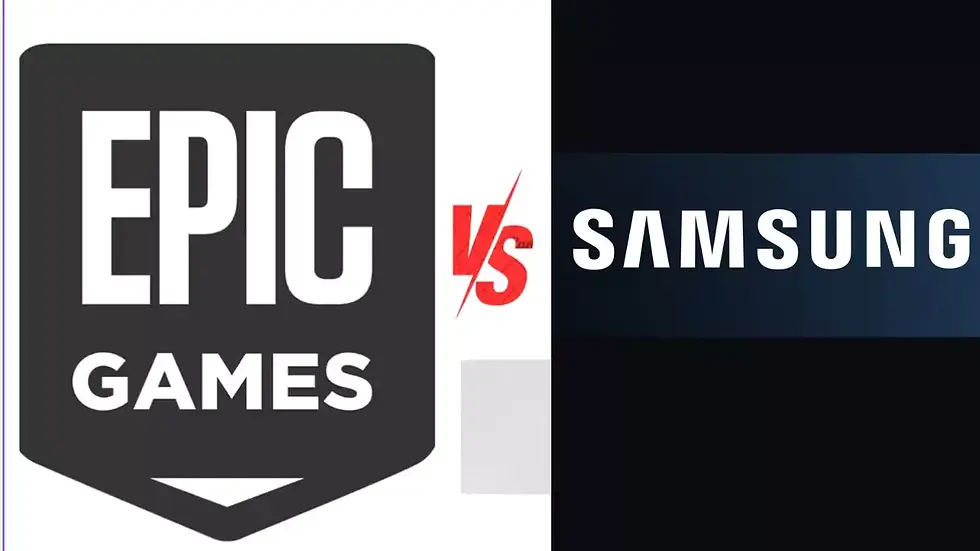Epic Games Settles Antitrust Lawsuit with Samsung Over App Store Restrictions
- Sagar Mankar

- Jul 12, 2025
- 3 min read

Epic Games has officially reached a settlement with Samsung, ending its antitrust lawsuit against the tech giant after months of legal back-and-forth. While the exact terms of the agreement haven't been made public, the decision marks a significant development in Epic’s broader fight against what it calls anti-competitive mobile platform practices.
The original lawsuit, filed in late 2024, accused Samsung of blocking users from easily installing third-party apps, including Epic’s own storefront and titles like Fortnite. One of the major points of contention was Samsung’s “Auto Blocker” feature, which was rolled out in October 2023. Initially opt-in, the feature became default in July 2024, automatically preventing sideloading of apps that weren’t downloaded from the Google Play Store or the Samsung Galaxy Store.
Epic argued that the feature created a hostile environment for alternative app ecosystems. According to the company, it took users an “onerous 21-step process” just to install the Epic Games Store on a Samsung device, and even then, the software was flagged as coming from an “unknown source,” despite Epic having games listed on Samsung’s Galaxy Store in the past.
Tim Sweeney, CEO and founder of Epic Games, confirmed the settlement in a recent post on X (formerly Twitter), saying, “We’re dismissing our court case against Samsung following the parties’ discussions. We are grateful that Samsung will address Epic’s concerns.” The company did not provide additional details about what changes might be coming.
In a broader context, this settlement represents yet another milestone in Epic’s legal campaign against what it views as monopolistic behavior by major mobile platform holders. According to Chris Hewish, chief strategy officer at Xsolla, “This settlement and the broader momentum around developer rights signal a monumental shift in mobile game monetization, one that’s long overdue.”
Samsung has not publicly responded to the settlement or the criticisms raised in the lawsuit. Meanwhile, Epic’s separate case against Google is still ongoing.
Timeline of Epic Games v. Samsung Electronics Case
2017: Fortnite was released
Mid-2018: Epic launches Fortnite on iOS via the App Store and on Android as a sideloaded package, bypassing Google Play to avoid the 30% revenue cut.
August 2020: Epic introduces a direct payment system in Fortnite. This triggers the removal of Fortnite from both the App Store and Google Play, prompting Epic to file lawsuits against Apple and Google on the same day in the U.S. District Court for the Northern District of California, alleging anti-competitive practices.
July 2021: A coalition of 36 states and the District of Columbia sues Google over its app store practices, mirroring some of Epic’s complaints. This parallel litigation strengthens Epic’s position against Google.
October 2021: Google countersues Epic, claiming Epic violated its contract by offering a Fortnite version outside Google Play’s payment system, seeking damages for unjust enrichment.
September 2023: Google settles the state-led lawsuit for $700 million and agrees to allow greater app store competition on Android, though this does not fully resolve Epic’s case. A jury trial in the Epic Games v. Google case concludes, finding Google guilty of anti-competitive practices in maintaining the Google Play Store’s dominance.
September 30, 2024: Epic Games accuses Google and Samsung of conspiring to protect Google Play from competition, filing a new lawsuit. The complaint centers on Samsung’s Auto Blocker feature, introduced with One UI 6.1.1, which prevents app installations from unauthorized sources, allegedly to favor Google Play and Samsung’s Galaxy Store.
Late September 2024: Epic’s counsel files a motion to “relate” the Samsung case to the ongoing Epic v. Google litigation, requesting Judge James Donato—who presided over the Google trial—to oversee this case as well.
October 2, 2024: Judge Donato is officially assigned to hear the Epic Games v. Samsung case, confirming the relatedness to the Google litigation.
July 7, 2025: Tim Sweeney announces on X that Epic is dismissing the lawsuit against Samsung following settlement negotiations.



Comments